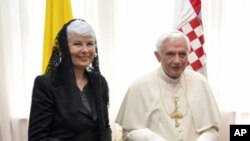Pope Benedict says he supports Croatia's membership in the European Union (EU) if the mainly Catholic Balkan nation helps to defend Christian values. The pontiff made his remarks in the capital, Zagreb, at the start of his two-day trip to the country.
A small boy and a small girl, dressed in traditional Croatian costumes, were among the first to meet Pope Benedict, handing him a bouquet of flowers.
The pontiff's arrival at Zagreb's Pleso airport marked the beginning of his first visit to Croatia, at a time when it seeks membership in the European Union.
A military honor guard stood nearby as the 84-year-old pope slowly walked over a red carpet to a platform to shield him from the burning Balkan sun.
There, Croatia's President Ivo Josipovic told Pope Benedict that his trip comes at a historic moment for Croatia, where nearly nine out of 10 people are Roman Catholics.
Mr. Josipovic says that as president he shares “the joy of millions of Croatian Catholic believers who are greeting” the pope on this pastoral visit. The president recalls that Croatia declared itself an independent democratic state 20 years ago and that the Vatican was among the first to recognize this Balkan nation. The 20th anniversary also coincides with the expected completion of Croatia's European Union membership negotiations.
President Josipovic also said the Roman Catholic church played a key role in “ending aggression” against his country, a reference to attacks by Serb forces who opposed Croatia's independence from Serb-led Yugoslavia in 1991.
Pope Benedict stood up, saying he supports European Union membership for Croatia. However, he also made clear that he expects Croatia to protect Christian values. Pope Benedict spoke of Croatia sharing its human and Christian values with other European countries as it enters the European Union, and that he wants the country to help Europe preserve what he called the "common heritage" of Christian values.
The Vatican has expressed concerns about what it views as Europe straying away from Christianity, amid growing materialism and secularism.
Croatia is expected to learn this month or next if talks to join the 27-member EU can be concluded, with membership expected in 2012 or 2013. Croatian officials hope Pope Benedict will help to make more people enthusiastic for membership.
Anti-EU sentiment grew in April after the Netherlands-based United Nations Tribunal sentenced wartime General Ante Gotovina to 24 years in prison because of his role in a 1995 military offensive to drive Serb rebels out of land they had occupied.
The EU had made his transfer to the tribunal a key condition for Croatia's membership, but many Croats view the general as a hero.
There have also been protests against the pope's arrival by people who oppose spending several millions of dollars on the trip at a time of economic crisis.
On Sunday, the pontiff is to celebrate Mass to mark the Croatian national family day. He was also to pray before the tomb of World War II era anti-communist Cardinal Alojzije Stepinac, whom the late Pope John Paul beatified during a 1998 trip.
Pope Urges Croatia to Defend Christianity As EU Member
- By Stefan Bos




